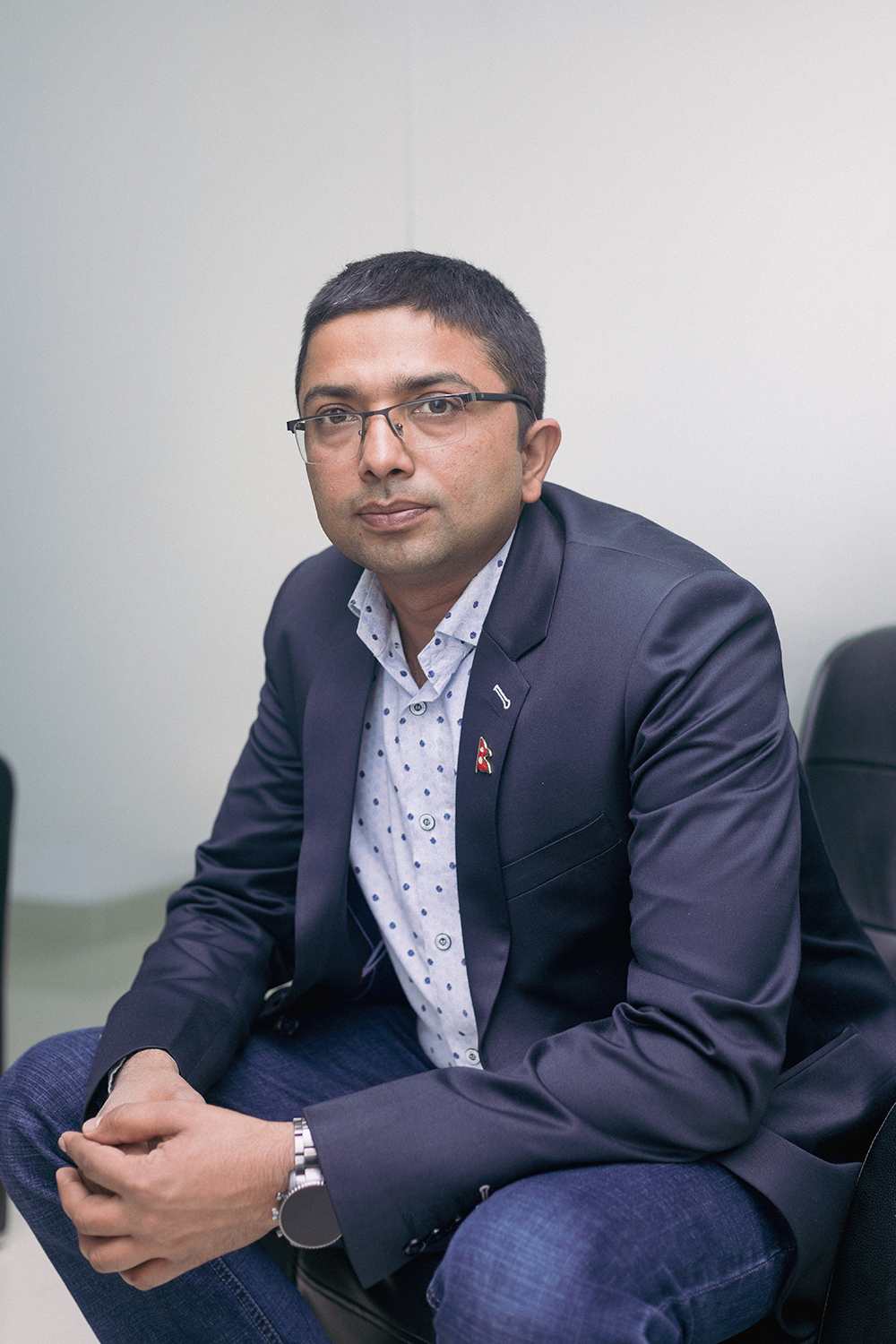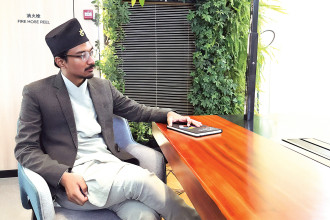
There are many reasons that became the cause for Bidur Acharya to establish Edusanjal. Some of it goes back to his college days when he found it difficult to find information on available scholarships to study abroad. His friends were reluctant to share information as fellow applicants. Acharya was one of the most brilliant students in his village, and he often received request for information on the different subjects, courses and colleges from relatives and other village folks. "This might be the story of every student and village in Nepal. So, I thought why not start something where students are able to get all the information they require on a single platform," he shares. And that is exactly how Edusanjal came about as a platform that could provide correct information to students.
Acharya studied in Pyuthan throughout his early education going on eventually to complete his Master's degree in Medical Microbiology from Tribhuvan University. He then taught Microbiology to MBBS and Nursing students as an Assistant Professor at the Patan Academy of Health Sciences, while also teaching international students online. He wanted to pursue a PhD in the United States but gave up on the idea due to personal reasons. "However, while searching for a college I faced some problems and I shared about these hassles with some friends studying IT who had been through similar experiences," he says.
In 2011, Acharya established Edusanjal, an ed-tech company promoting the concept of 'Study in Nepal' and empowering students to make informed decisions. “We help students by providing timely, comprehensive and accurate information about all the programmes offered in Nepal and facilitate them by helping them find the right academic institutions," he states. "We also assist them with scholarship procedures."
 One of the biggest challenges that Edusanjal faces, reveals Acharya, is that currently, many students prefer to study outside of Nepal. "Convincing them to explore opportunities here is a herculean task and we alone will not be able to make substantive changes," he says, "We have started holding discussions with member colleges and other academic institutions to devise campaigns to persuade students to opt for higher education in Nepal." The company has also been receiving queries about programmes offered in Nepal from students of other SAARC nations, however, since there is no clarity regarding this, the company has not been able to make much headway in this direction.
Acharya states that content-marketing is their biggest strength. "We believe in organic growth and are here for the long term so our priority has always been in providing value to end-users through our content," he shares. It is due to this, Edusanjal attracts thousands of visitors to their site every day. The company has a comprehensive database of all higher education programmes and institutions offering various academic degrees in Nepal. To add value for students, Acharya says they have commenced a digital learning platform with the launch of CMAT portal. He also has plans to add more entrance preparation courses for BSc CSIT and BCA on their platform. The team is also planning to guide applicants preparing for the Civil Service Examinations.
Besides regular services, Edusanjal also conducts 'Study in Nepal' and '+2 Scholarships' campaigns by collaborating with schools and colleges. It hosts discussions with stakeholders of the education sector and collaborates with other organisations in the ecosystem.
"We have been in the business for a little over a decade now, yet we find it difficult to convince some of the established educational institutions to join us," divulges Acharya, adding they would rather spend their advertising budget on traditional methods which are not as effective now. "Or most rely on social media to reach out to students." He also rues the fact that though Edusanjal has been promoting education in Nepal the government has till date not done anything to facilitate them. "We are not looking for any monetary facility from the state but the government needs to realise that no country can progress economically if entrepreneurs are not encouraged to start new ventures," he states.
Acharya says with some conviction that Edusanjal is determined to make Nepal an education hub of Asia. "Nepal has ample opportunities to establish itself as a regional education hub and the only thing lacking is confidence among the stakeholders," he mentions. "Due to a risk-averse attitude and lack of coordination among stakeholders, we have lost this opportunity when countries like Bangladesh and India empower their education institutions to attract foreign students," he states.
READ ALSO:
One of the biggest challenges that Edusanjal faces, reveals Acharya, is that currently, many students prefer to study outside of Nepal. "Convincing them to explore opportunities here is a herculean task and we alone will not be able to make substantive changes," he says, "We have started holding discussions with member colleges and other academic institutions to devise campaigns to persuade students to opt for higher education in Nepal." The company has also been receiving queries about programmes offered in Nepal from students of other SAARC nations, however, since there is no clarity regarding this, the company has not been able to make much headway in this direction.
Acharya states that content-marketing is their biggest strength. "We believe in organic growth and are here for the long term so our priority has always been in providing value to end-users through our content," he shares. It is due to this, Edusanjal attracts thousands of visitors to their site every day. The company has a comprehensive database of all higher education programmes and institutions offering various academic degrees in Nepal. To add value for students, Acharya says they have commenced a digital learning platform with the launch of CMAT portal. He also has plans to add more entrance preparation courses for BSc CSIT and BCA on their platform. The team is also planning to guide applicants preparing for the Civil Service Examinations.
Besides regular services, Edusanjal also conducts 'Study in Nepal' and '+2 Scholarships' campaigns by collaborating with schools and colleges. It hosts discussions with stakeholders of the education sector and collaborates with other organisations in the ecosystem.
"We have been in the business for a little over a decade now, yet we find it difficult to convince some of the established educational institutions to join us," divulges Acharya, adding they would rather spend their advertising budget on traditional methods which are not as effective now. "Or most rely on social media to reach out to students." He also rues the fact that though Edusanjal has been promoting education in Nepal the government has till date not done anything to facilitate them. "We are not looking for any monetary facility from the state but the government needs to realise that no country can progress economically if entrepreneurs are not encouraged to start new ventures," he states.
Acharya says with some conviction that Edusanjal is determined to make Nepal an education hub of Asia. "Nepal has ample opportunities to establish itself as a regional education hub and the only thing lacking is confidence among the stakeholders," he mentions. "Due to a risk-averse attitude and lack of coordination among stakeholders, we have lost this opportunity when countries like Bangladesh and India empower their education institutions to attract foreign students," he states.
READ ALSO:
Nepal has ample opportunities to establish itself as a regional education hub and the only thing lacking is confidence among the stakeholders," he mentions. "Due to a risk-averse attitude and lack of coordination among stakeholders, we have lost this opportunity when countries like Bangladesh and India empower their education institutions to attract foreign studentsAt present, Edusanjal is a team of 25 passionate youths determined to empower students and help academic institutions attract the best students with Acharya overseeing the overall strategy and policy based on the recommendations of department heads. He claims that Edusanjal has a strong search engine presence and the organisation produces high-quality content which attracts students from across the country. As a result, it also provides domestic colleges with a platform to promote themselves by integrating through a content-rich website. In fact, they are the only SaaS company in Nepal which provides colleges with an integrated suite to market themselves among Nepali students and manage leads and admissions from a single portal. With a decade of promoting 'Study in Nepal', he says Edusanjal knows what works and does not work in the Nepali academic market, thus giving them the ability to make tailored solutions to Nepali colleges about the strategies they need to implement to attract and retain Nepali students. While establishing Edusanjal, Acharya focused on being a lean startup. The company started generating cash within a few months of operation. "Hurdles like the earthquake and Covid pandemic did affect us but since we are a lean team we were able to overcome these pretty easily," he shares.
 One of the biggest challenges that Edusanjal faces, reveals Acharya, is that currently, many students prefer to study outside of Nepal. "Convincing them to explore opportunities here is a herculean task and we alone will not be able to make substantive changes," he says, "We have started holding discussions with member colleges and other academic institutions to devise campaigns to persuade students to opt for higher education in Nepal." The company has also been receiving queries about programmes offered in Nepal from students of other SAARC nations, however, since there is no clarity regarding this, the company has not been able to make much headway in this direction.
Acharya states that content-marketing is their biggest strength. "We believe in organic growth and are here for the long term so our priority has always been in providing value to end-users through our content," he shares. It is due to this, Edusanjal attracts thousands of visitors to their site every day. The company has a comprehensive database of all higher education programmes and institutions offering various academic degrees in Nepal. To add value for students, Acharya says they have commenced a digital learning platform with the launch of CMAT portal. He also has plans to add more entrance preparation courses for BSc CSIT and BCA on their platform. The team is also planning to guide applicants preparing for the Civil Service Examinations.
Besides regular services, Edusanjal also conducts 'Study in Nepal' and '+2 Scholarships' campaigns by collaborating with schools and colleges. It hosts discussions with stakeholders of the education sector and collaborates with other organisations in the ecosystem.
"We have been in the business for a little over a decade now, yet we find it difficult to convince some of the established educational institutions to join us," divulges Acharya, adding they would rather spend their advertising budget on traditional methods which are not as effective now. "Or most rely on social media to reach out to students." He also rues the fact that though Edusanjal has been promoting education in Nepal the government has till date not done anything to facilitate them. "We are not looking for any monetary facility from the state but the government needs to realise that no country can progress economically if entrepreneurs are not encouraged to start new ventures," he states.
Acharya says with some conviction that Edusanjal is determined to make Nepal an education hub of Asia. "Nepal has ample opportunities to establish itself as a regional education hub and the only thing lacking is confidence among the stakeholders," he mentions. "Due to a risk-averse attitude and lack of coordination among stakeholders, we have lost this opportunity when countries like Bangladesh and India empower their education institutions to attract foreign students," he states.
READ ALSO:
One of the biggest challenges that Edusanjal faces, reveals Acharya, is that currently, many students prefer to study outside of Nepal. "Convincing them to explore opportunities here is a herculean task and we alone will not be able to make substantive changes," he says, "We have started holding discussions with member colleges and other academic institutions to devise campaigns to persuade students to opt for higher education in Nepal." The company has also been receiving queries about programmes offered in Nepal from students of other SAARC nations, however, since there is no clarity regarding this, the company has not been able to make much headway in this direction.
Acharya states that content-marketing is their biggest strength. "We believe in organic growth and are here for the long term so our priority has always been in providing value to end-users through our content," he shares. It is due to this, Edusanjal attracts thousands of visitors to their site every day. The company has a comprehensive database of all higher education programmes and institutions offering various academic degrees in Nepal. To add value for students, Acharya says they have commenced a digital learning platform with the launch of CMAT portal. He also has plans to add more entrance preparation courses for BSc CSIT and BCA on their platform. The team is also planning to guide applicants preparing for the Civil Service Examinations.
Besides regular services, Edusanjal also conducts 'Study in Nepal' and '+2 Scholarships' campaigns by collaborating with schools and colleges. It hosts discussions with stakeholders of the education sector and collaborates with other organisations in the ecosystem.
"We have been in the business for a little over a decade now, yet we find it difficult to convince some of the established educational institutions to join us," divulges Acharya, adding they would rather spend their advertising budget on traditional methods which are not as effective now. "Or most rely on social media to reach out to students." He also rues the fact that though Edusanjal has been promoting education in Nepal the government has till date not done anything to facilitate them. "We are not looking for any monetary facility from the state but the government needs to realise that no country can progress economically if entrepreneurs are not encouraged to start new ventures," he states.
Acharya says with some conviction that Edusanjal is determined to make Nepal an education hub of Asia. "Nepal has ample opportunities to establish itself as a regional education hub and the only thing lacking is confidence among the stakeholders," he mentions. "Due to a risk-averse attitude and lack of coordination among stakeholders, we have lost this opportunity when countries like Bangladesh and India empower their education institutions to attract foreign students," he states.
READ ALSO:
Published Date: December 4, 2022, 12:00 am
Post Comment
E-Magazine
RELATED Innovation





